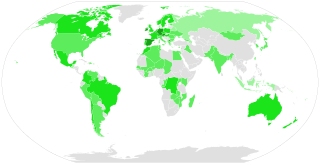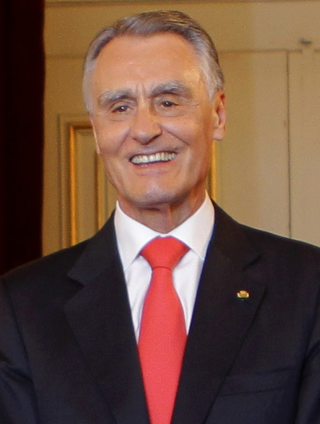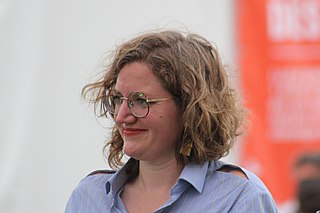Related Research Articles

A green party is a formally organized political party based on the principles of green politics,such as environmentalism and social justice.

The Greens was a centre-left to left-wing green-ecologist political party in France. The Greens had been in existence since 1984,but their spiritual roots could be traced as far back as RenéDumont's candidacy for the presidency in 1974. On 13 November 2010,The Greens merged with Europe Ecology to become Europe Ecology –The Greens.

Politics in Portugal operates as a unitary multi-party semi-presidential representative democratic republic,whereby the Prime Minister of Portugal is the head of government,and the President of Portugal is the non-executive head of state which,although it is a somewhat ceremonial figure,has some significant political powers they exercise often. Executive power is exercised by the Government,whose leader is the prime minister. Legislative power is primarily vested in the Assembly of the Republic,although the government is also able to legislate on certain matters. The Judiciary of Portugal is independent of the executive and the legislature. The President exerts a sort of "moderating power",not easily classified into any of the traditional three branches of government.

The Australian Greens (AG),commonly referred to simply as the Greens,are a confederation of green state and territory political parties in Australia. As of the 2022 federal election,the Greens are the third largest political party in Australia by vote and the fourth-largest by elected representation. The leader of the party is Adam Bandt,with Mehreen Faruqi serving as deputy leader. Larissa Waters currently holds the role of Senate leader.

The Ecologist Green Party of Mexico is a green political party in Mexico. Founded in 1986,the party is associated with Jorge González Torres and his son Jorge Emilio González Martínez. It has seldom gotten more than 10% of the vote nationwide,but in the 21st century has joined alliances with different major parties.

The Ecologist Party "The Greens" is a Portuguese eco-socialist political party. It is a member of the European Greens and a founding member of the European Federation of Green Parties.

The Federation of the Greens,frequently referred to as Greens (Verdi),was a green political party in Italy. It was formed in 1990 by the merger of the Federation of Green Lists and the Rainbow Greens.

Elections in Portugal are free,fair,and regularly held,in accordance with election law.

The Unitary Democratic Coalition is an electoral and political coalition between the Portuguese Communist Party and the Ecologist Party "The Greens". The coalition also integrates the political movement Democratic Intervention.

The 1995 Portuguese legislative election took place on 1 October. The election renewed all 230 members of the Assembly of the Republic.

The Green Party- The Greens,often shortened to The Greens is a Romanian political party that ideologically follows green politics and environmentalism. It is currently led by co-Presidents Marius Lazăr and Lavinia Cosma. The Green Party is the only political party in Romania that is a member of the European Green Party (EGP). Thus,it is a full rights member of the European Green Party (EGP),represented by the Greens–European Free Alliance in the European Parliament.

Presidential elections were held in Portugal on 23 January 2011. The elections resulted in the re-election of Aníbal Cavaco Silva to a second term as President of Portugal. Turnout in this election was very low,where only 46.52 percent of the electorate cast their ballots. Cavaco Silva won by a landslide winning all 18 districts,both Autonomous regions of Azores and Madeira and 292 municipalities of a total of 308.

The United People Alliance was an electoral and political coalition between the Portuguese Communist Party (PCP) and the Portuguese Democratic Movement (MDP-CDE). After 1983,the Ecologist Party "The Greens" also joined.
The Ecologists,formerly known as Europe Ecology –The Greens is a centre-left to left-wing green political party in France. The party is a member of the European Green Party. The party was formed on 13 November 2010 from the merger of The Greens and Europe Ecology.
Legambiente is an Italian environmentalist association with roots in the anti-nuclear movement that developed in Italy and throughout the Western world in the second half of the 1970s. Founded in 1980 as part of the ARCI,it later became a stand-alone organisation. Originally known as Lega per l'ambiente,it changed name during the IV National Congress held in Parma in 1992. The mission of the association is to make the environmental culture the centre of a new kind of development and diffused well-being. Important values for the association are the improvement of environmental quality,the fight against all forms of pollution,a wise use of natural resources,the construction of a more balanced relationship between human beings and the nature. It is considered the most widespread environmental organisation in Italy,as it is composed by a national headquarter in Rome,20 regional branches,about 1,000 local groups and more than 115,000 members.

The 2008 Azorean regional election was an election held on 19 October 2008 for the legislative assembly and government of the Portuguese autonomous region of the Azores. in which the Socialist Party,under the leadership of Carlos César won a third mandate with 46.7 percent of the turnout,while their rivals,under the Social Democratic Party leader Carlos Costa Neves,received 30.27 percent of the vote:this result would lead to Neves' resignation in the following days.

Marie Toussaint is a French jurist and politician who was first elected as a Member of the European Parliament in 2019.

Francisco Guerreiro is a Portuguese politician currently serving as an independent Member of the European Parliament for Portugal,having been elected whilst standing as a candidate for People Animals Nature.
Maria Amélia do Carmo Mota Santos is a Portuguese politician and academic. She served as a Member of the European Parliament from 1989 to 1994 and a member of the Assembly of the Republic from 1985 to 1989 and from 1999 to 2005.
Celeste Correia is a naturalized Portuguese teacher and politician,originally from the former Portuguese colony of Cape Verde. She represented the Portuguese Socialist Party (PS) as a member of the Assembly of the Republic between 1995 and 2011 and,again,from 2014 to 2015.
References
- 1 2 "Isabel Castro, PEV". Assembleia da República. Retrieved 13 July 2024.
- ↑ ""Os Verdes": Isabel Castro vai ser substituída "por alguns meses"". Público. 31 August 2004. Retrieved 13 July 2024.
- ↑ "Isabel de Castro sai "decepcionada"". Jornal de Notícias. 26 May 2006. Retrieved 13 July 2024.
- ↑ "Isabel Castro" (PDF). A 25 Abril. Retrieved 13 July 2024.
- ↑ ""Desastre iminente." Ex-deputada d'Os Verdes lamenta falta de empenho na COP26". TSF. 12 November 2021. Retrieved 13 July 2024.
- ↑ "Isabel Castro". Green European Journal. Retrieved 13 July 2024.